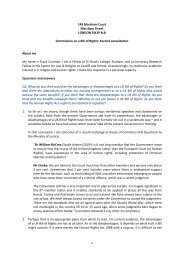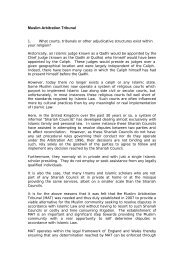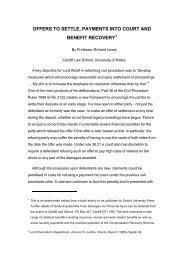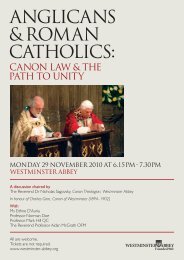Constitutional patriotism - Cardiff Law School
Constitutional patriotism - Cardiff Law School
Constitutional patriotism - Cardiff Law School
Create successful ePaper yourself
Turn your PDF publications into a flip-book with our unique Google optimized e-Paper software.
ANU E-PressDr Vito Breda<strong>Constitutional</strong> Patriotism & Identitythe French Revolution, and it is a 'mutation' of the sociological nature of nationalism.Polycentric nationalism adds three features to the old ethnocentric nationalism. Firstly,modern nationalism is an autonomous political movement that does not need to link itselfto divinity (as ethnocentric nationalism does) in order to demand the protection of itspolitical rights. Secondly, it claims that each nation has its own distinct sociologicalcharacteristics. The protection of these cultural features provides the theoretical supportsfor its political claims. Given that these sociological aspects vary, different nations havedifferent claims. Thirdly, modern nationalism recognises the existence of equal rights amongdifferent nations. The acknowledgment of the existence of other groups with their ownclaims makes modern nationalism respectful of the aforementioned comprehensive idea ofpluralism. 45In contrast with Smith, Habermas focuses exclusively on the potentially destabilising ethnicelement of nationalism. In Habermas all nations are inherently dangerous and directlyconnected with a history of intolerance and genocide. 46 Examples given by Habermas of lessdangerous nation-state partnerships include the American and Swiss federations. The‘average’ American or Swiss citizen might be constantly reminded of the pluralist genesis ofthe countries' constitutional assets. However, the sense of attachment to libertarianprinciples such as the freedom of speech (and other substantive rights) 47 cannot bedissociated from the practices that have incorporated those constitutional assets into ashared national image. 48 It is unclear, however, whether the U.S. and/or Switzerland couldbe considered constitutional polities that are less or more 'nationalist' in comparison to anyother European polity. The American loyalty to constitutional values is, for instance,understood by Americans as a national asset, not as a protection of universal constitution. 49A more convincing theory of constitutional <strong>patriotism</strong> would suggest a close monitoring ofthe partnership between national identity and state rather than an a priori exclusion ofclaims based on nationalisms. In this reasonable version, constitutional <strong>patriotism</strong> is aninspirational model of social cohesion for citizens who participate in the process of settingtheir constitutional norms. It is unavoidable that such an unhinged process (that mightrequires vigilant democrats) will take some risks, and the citizen has to be made aware ofthose risks. However, the historically justified vigilance regarding the possible undemocraticeffect of nationalism or religious extremism cannot be stretched in order to exclude eitherreligion or nationalism from a deliberative democracy. Again, that would be forcing acommunity to accept neutral pluralism rather than reasonably deliberating over itsimplications.45 Rosenfeld Michel, 'Habermas's Call for Cosmopolitan <strong>Constitutional</strong> Patriotism in an Age of Global Terror: APluralist Appraisal' (2007) 14(2) Constellations 1,46 Jürgen Habermas, Between Facts and Norms : Contributions to a Discourse Theory of <strong>Law</strong> and Democracy(1996)11147 Michel Rosenfeld, The Identity of the <strong>Constitutional</strong> Subject (2010)48 Benedict Anderson, Imagined Communities : Reflections on the Origin and Spread of Nationalism (1983)49 Margaret Canovan, 'Patriotism Is Not Enough' (2000) 40/3(3) British Journal of political science 413, 42613 | P a g e
















